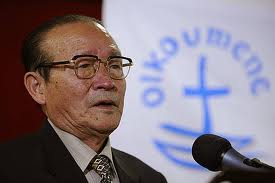
Christianity is growing in China, but continues to face difficulties and an increasing need for resources, according to the head of a major Christian organization.
"The church … presents four characteristics: independent and autonomous, post-denominational, fast growing and faced with lots of challenges and emerging difficulties," said the Rev. Gao Feng, president of the China Christian Council (CCC), on 14 June.
Feng was speaking in Nanjing at a meeting of the World Council of Churches' (WCC) international affairs commission - the first officially sanctioned WCC and CCC-sponsored meeting held in China since the WCC's establishment in 1948.
Speaking on the topic of the "Church in China Today" at a seminar on "Understanding China," Feng said that "many grassroots churches don't have ordained pastors."
In addition, he noted, "lay leaders who manage churches and preach on Sundays may not have formal theological education; seminaries lack faculty members and library resources. The changes in the religious policies of the Chinese government after the cultural revolution, especially since the early 1980s, have helped the reopening of churches, setting up new seminaries and reopening old ones and printing Bibles."
In a seminar on the role of religion in creating a harmonious society in China and on religious policies, the Vice Minister for Religious Affairs, Jiang Jianyong, said, "if there is no religious harmony, then no social harmony exists in society and it is in this context that the government recognizes and encourages the role of religions in developing a harmonious society."
He added that "policies of the Chinese government calling on religion for building a harmonious society are based on four principles: harmony within one religion is prerequisite; interfaith harmony; harmony between religions and society for peaceful order; harmony between religions and the state," he said. Jianyong said China gives freedom to all religions, but expects that religion and religious activities will not interfere with affairs of the state and its administrative matters. In China, there is no predominant religion and all religions are treated equally, he said. The Chinese government believes that the "state cannot develop or extinguish any religion."
Meanwhile, the WCC's general secretary, the Rev. Olav Fykse Tveit, told students and faculty of the Nanjing Theological Seminary that the "church in China is part of the body of Christ and an integral part of the global fellowship of churches around the world." During a visit to the Amity publishing company, Tveit received the 80 millionth Bible printed and published in China by the Amity Foundation and the CCC. The Pew Forum on Religion and Public Life, based in Washington, D.C., estimated in a December 2011 report that there are more than 67 million Christians in China. Jianyong visited the WCC office in Geneva in 2003 when he was head of the Jiangsu Provincial State Administration of Religious Affairs. The CCC was established in 1980.
More information on the WCC and the China Christian Council is here:
